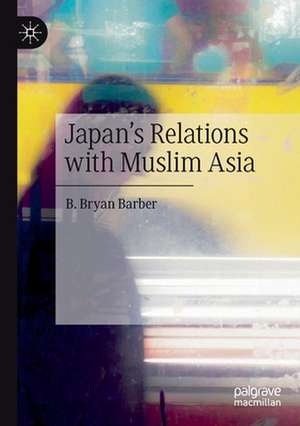Japan's Relations with Muslim Asia
Autor B. Bryan Barberen Limba Engleză Paperback – 19 dec 2020
| Toate formatele și edițiile | Preț | Express |
|---|---|---|
| Paperback (1) | 581.01 lei 6-8 săpt. | |
| Springer International Publishing – 19 dec 2020 | 581.01 lei 6-8 săpt. | |
| Hardback (1) | 590.63 lei 6-8 săpt. | |
| Springer International Publishing – 19 dec 2019 | 590.63 lei 6-8 săpt. |
Preț: 581.01 lei
Preț vechi: 683.54 lei
-15% Nou
Puncte Express: 872
Preț estimativ în valută:
111.19€ • 115.66$ • 91.79£
111.19€ • 115.66$ • 91.79£
Carte tipărită la comandă
Livrare economică 15-29 aprilie
Preluare comenzi: 021 569.72.76
Specificații
ISBN-13: 9783030342821
ISBN-10: 3030342824
Pagini: 261
Ilustrații: XVII, 261 p. 9 illus., 1 illus. in color.
Dimensiuni: 148 x 210 mm
Greutate: 0.34 kg
Ediția:1st ed. 2020
Editura: Springer International Publishing
Colecția Palgrave Macmillan
Locul publicării:Cham, Switzerland
ISBN-10: 3030342824
Pagini: 261
Ilustrații: XVII, 261 p. 9 illus., 1 illus. in color.
Dimensiuni: 148 x 210 mm
Greutate: 0.34 kg
Ediția:1st ed. 2020
Editura: Springer International Publishing
Colecția Palgrave Macmillan
Locul publicării:Cham, Switzerland
Cuprins
1. Bridging Two Asias.- 2. Discovery and Identity.- 3. Access to Energy.- 4. Access to Markets.- 5: Development and Aid.- 6. Democratization and Human Rights.- 7. Sanctions and Interventions.- 8. Conclusions.
Recenzii
“Japan’s Relation with Muslim Asia touches on important points in Japan’s strategies toward Muslim-majoritystates in different dimensions, its ‘unique’ approach to the securitization of Islam may not be clear. The book is an attemptto add a new and fresh perspective to the existing literature. Its diverse, multi-language references will open many paths for furtherresearch on this topic. … this book is a must-have for anyone interested in Japanese-Muslim relations.” (Mustafa Onur Yalçın, Insight Turkey, Vol. 23 (2), 2021)
Notă biografică
B. Bryan Barber is Research Fellow at the Mohsin and Fauzia Jaffer Center for Muslim World Studies, Florida International University, USA, and Teaching Fellow at the Center for Preparatory Studies, Nazarbayev University, Kazakhstan.
Textul de pe ultima copertă
This book offers a useful and extensive account of Japan’s past discoveries and present interactions with Muslim states and societies across Asia. Bearing in mind the U.S.-led global meta-narrative of Islam spoken in tandem with security and threats, this book examines how this reconciles with Japan’s self-proclaimed “values-based” approach to diplomacy across Asia in the twenty-first century. The author considers Japan’s historic conceptualization and learning of Islam, and its acute needs for access to markets and energy from Muslim-majority states in Asia. He also argues that Japan securitizes Islam in a manner distinct from Western, Russian, or Chinese securitization today, but that Japan promotes itself as a model for human security and development across an Asia inclusive of Muslim states. Japan’s approach to Islam and Muslim societies today offers much from which other great powers can learn.
B. Bryan Barber is Research Fellow at the Mohsin and Fauzia Jaffer Center for Muslim World Studies, Florida International University, USA, and Teaching Fellow at the Center for Preparatory Studies, Nazarbayev University, Kazakhstan.
Caracteristici
Showcases a pivotal relationship in international politics that is widely unexplored Brings together religion, civilizations, energy and economic development within twenty-first-century international relations Provides an analytical framework that offers opportunities for broader discussion and progress beyond Islam or Japan
